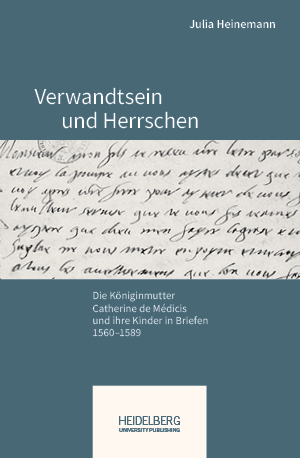
Zitationsvorschlag
Lizenz

Dieses Werk steht unter der Lizenz Creative Commons Namensnennung - Weitergabe unter gleichen Bedingungen 4.0 International.
Identifier
Veröffentlicht
Verwandtsein und Herrschen
Die Königinmutter Catherine de Médicis und ihre Kinder in Briefen, 1560–1589
Catherine de Médicis war fast 30 Jahre lang eine zentrale politische Figur der französischen Monarchie. Ihre Autorität beruhte auf ihrer Position als Königinmutter. Die Studie geht der Frage nach, was Verwandtsein für sie und ihre Nachkommen war, wie verwandtschaftliche Beziehungen ausgehandelt wurden und wie Verwandtsein und Herrschen in der Praxis zusammenhingen. Was war eine Königinmutter, ein königlicher Sohn oder eine königliche Schwester? Die Briefe, die sich Mutter und Kinder schrieben, machen Verwandtschaft als flexibles Repertoire politischen Denkens und Handelns sichtbar. In einer Epoche, die als Entstehungszeit moderner Staaten betrachtet wird, wurde so Königsherrschaft in verwandtschaftlichen Beziehungen immer wieder neu konzeptualisiert und legitimiert.
Rezensionen und Presse
Hendrik Müller, in: Zeitschrift für Geschichtswissenschaft 69, 7/8 (2021), 677–79.
Katrin Keller, in: Zeitschrift für Historische Forschung 48, 3 (2021), 615–17.
Claudia Opitz-Belakhal, in: L'Homme. Europäische Zeitschrift für Feministische Geschichtswissenschaft, 33,1 (2022), 153–157.
Elena Taddei, in: Mitteilungen des Instituts für Österreichische Geschichtsforschung, 130, 2 (2022), 389–390.





